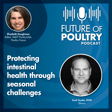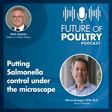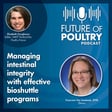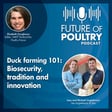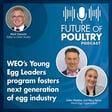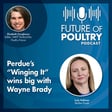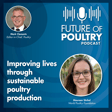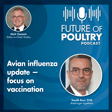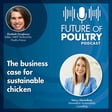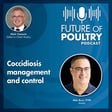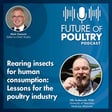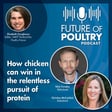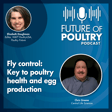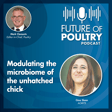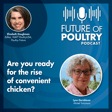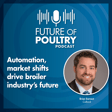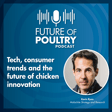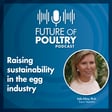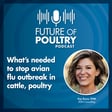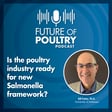Introduction and Guest Introduction
00:00:00
Speaker
Hello, and welcome to the Future of Poultry podcast series. Hello, I'm Liz Steffman, the editor of Watt Poultry USA and Poultry Future. In today's episode, my guest is Christophe Palatier, global food and agriculture futurist, strategist, and advisor at the Food Futurist.
00:00:28
Speaker
Pelletier is also the keynote speaker at the upcoming Chicken Marketing Summit, scheduled for July 29th through 31st at the Renaissance Birmingham Ross Bridge Golf Resort and Spa in Birmingham, Alabama. This one-of-a-kind event will look forward to the consumer of 2035 and the issues that will impact their protein choices. Registration is now open with early bird savings available until May 31st.
00:00:55
Speaker
For more information, go to chickenmarketingsummit.com. Thanks for joining me today, Christophe.
The Role of a Food Futurist
00:01:01
Speaker
To begin, what exactly is a food futurist and what do they do? Well, of course, that would depend on the futurist, so I can only speak for myself. So that's something I've been doing for 15 years. Actually, I started in May 2009.
00:01:18
Speaker
My goal really is to bring a comprehensive view of things to come, so how the future is going to shape up, what are the challenges coming our way, what are the opportunities, what are the things that have a future, which are the ones that don't have a future, what are going to change.
00:01:37
Speaker
And I look at it from many different angles. I look at from the demographic point of view, from geopolitics, from economy, but also a lot from human behavior. I think it's very important. A lot of things happen because of human behavior. A lot of things don't happen because of human behavior.
Human Behavior and Food Choices
00:01:58
Speaker
And I would say in the food sector, we are really at that crossroads also with the human behavior, because let's face it, a lot of people's choices in food are not based on very rational aspects. I don't think how many people who compose a meal based on, you know, how many
00:02:17
Speaker
how many calories, how many grams of protein, how many grams of fat, but a lot more about what they lack because certain foods remind them of certain experiences and so on. So there's a lot of psychology in food.
00:02:28
Speaker
And I really think it's very important if you want to look how things can evolve in the future to also look at those psychological aspects. And so my view, my approach is really about, yeah, like I say, comprehensive.
Approach to Futurism and Client Needs
00:02:43
Speaker
If you want, I like to take my clients
00:02:48
Speaker
in my little helicopter and we go high and we have a 360-degree view of things and then we go back down slowly. We zoom in on the specific activities of my clients and then see how that big picture really is going to influence them down the road. Of course, it depends about what timelines they have in line.
00:03:13
Speaker
What I deliver basically, when I try to have predictions and I've made many predictions, not so much because I like to do predictions. I don't have a pointy hat, I don't have a magic wand or a crystal ball. But I always look at the future from an angle, you know, what is likely, but also what is desirable.
00:03:32
Speaker
and try to find a good compromise between the two. Because what's desirable very often is what does not exist. So let's try to imagine how it could be. What's likely because, well, of that human behavior I was talking about. And humans are actually rather predictable. So we can really figure out, you know, what are the most likely events that can happen.
00:03:57
Speaker
And of course, there are always lots of events that don't happen. But so, yeah, I refocus on predictions that are substantiated by, you know, a number of parameters. And in the end, what I deliver, of course, depends on what my clients ask from me. If they have a specific topic and all, then, of course, I'm not going to bring the same generalities all the time. Plus, well, it would take probably half a year to tell it all.
00:04:24
Speaker
So, you know, I've worked two books about the subject, so there's a lot of predictions in there too. But no, I really focus on the practical aspects for my clients, you know, what is important for them, because let's face it, they want to know about the future because they're going to have to make some decisions. Is it investment? Is it certain strategical decisions? So yeah, let's be practical. Let's talk about the reality of their business, not just generalities.
00:04:53
Speaker
So yeah in a nutshell that's kind of you know my approach to it and yeah it seems to have worked very well. It sounds like a fascinating career.
Proactive Thinking in Business
00:05:03
Speaker
So why is it important for chicken companies to start thinking about the consumer of tomorrow now?
00:05:10
Speaker
Well, you know, the sooner you stop thinking about something, you start working on something, the more chances you have to succeed because you don't have the time pressure. There is nothing worse than deciding at the last minute and then
00:05:24
Speaker
Yeah, no pun intended, but a little bit like a chicken with no head, really. And you're going to make rash decisions, which are probably not the best. I think it's never too soon to start thinking about it. It doesn't mean you have to make the decisions right away. Of course, you just let it let it sink when it comes to the future. Well, you know,
00:05:49
Speaker
You have to think, does it make sense? Doesn't it make sense? You can't make decisions right away on your own. You really have to discuss it with other people. You have to test it with business partners and all the stakeholders. The sooner you start that conversation, the better. Let's face it, people love to talk about the future. Also, when there is plenty of time,
00:06:15
Speaker
Let's say vested interest don't play as much. So you have a much more objective and productive conversation.
Consumer Trends and Concerns
00:06:23
Speaker
What do you think are some of the biggest ways consumer trends are going to change in the next decade? Well, I think there are certain drivers that are already here and they're going to stay for at least the next decade. One is the environment. I think all the environmental issues are going to play on.
00:06:44
Speaker
for a while, possibly getting worse. So I think it's going to create a lot of anxiety. And when there is anxiety, people want to have, well, more safety, but they also want to have answers. They want to have the feeling that something is being done because, well, they feel vulnerable. The other topic, which is also for the same kind of reasons, it's health.
00:07:09
Speaker
you know, plenty of issues about health when it comes to food and the amount of food-related diseases, of course, is, you know, diabetes, overweight, cardiovascular diseases, and so on and so on. I think that's going to play more and more. I would not be surprised if we see people also kind of going back more to basics, and with that, I mean, you know, kind of
00:07:39
Speaker
more basic and old-fashioned nutrition. I think also, one topic I see also with health is going to be gut health, because when people are going to look more into nutrition, they're going to realize that nutrition is not just, you know, how many calories, how many protein, how much fat and so on.
00:07:58
Speaker
But it is also how is it absorbing the intestine? What is the bacteriological flora inside your intestine? And I think that's going to become a topic more and more. It's starting, but it's going to go further.
00:08:11
Speaker
Another aspect of health, I think we're going to talk more and more, is mental health. And I don't know if it's because the screens have replaced parents, but I think there are lots of people who are living with trauma. And we see that with polarisation, with going for all sorts of causes, a lot more anxiety, like I was speaking, and especially the younger generations.
00:08:40
Speaker
And I think all of that is going to affect how people look at the world, how they look at their life, how they look at the relationship with others. And food is going to play a role in this. Some people probably going to think that food can affect your mental health or so is it going to be a cure? Is it going to be to prevent or is it going to be just to make you feel good? But I think the topic is going to come up more and more.
00:09:07
Speaker
And also what I think is going to happen more and more in the future is the values are going to take the center stage.
Impact of Consumer Values on Purchasing Decisions
00:09:16
Speaker
in a lot of decisions for consumers. It's not going to be so much about the physical attributes of a product that still will play a role, but it's the value, the value of the producer and people, what we see is people are getting more and more radical in a way. If the producer claimed to have certain values, then of course people want to buy from that if they share the same values.
00:09:41
Speaker
if for whatever reason they have the feeling that the producer does not live up to his values, then the reaction is rather drastic. They just drop you right away. And I think that's going to play a role. So for the future, that's going to influence the way that producers are going to act.
00:10:05
Speaker
Because you're going to have to be true to your values, otherwise there's going to be a price to pay. So it's going to be more and more difficult to kind of try to tell little lies if you want. You're going to have to be sure a lot of integrity and to be true to your values. Or if you change your values, you have to explain why and try to convince people to steal for you. But that's going to play a very important role. Probably more even than the generational aspect.
Future Trends in Chicken Farming Systems
00:10:35
Speaker
So how do you think these changes are going to impact the future of chicken production and processing? Well, of course, when it comes to the things I was talking about, like an environment like values, well, it's going to be about farming systems.
00:10:49
Speaker
And well, we've seen that already, you know, it's not new. People are questioning more and more about how animals are farmed. And so the aspects of animal welfare, the way you treat animals, what you put in the field of animals, what is the environmental impact of animal farming.
00:11:09
Speaker
Definitely, that's going to be an increasingly important topic. And suppliers are going to have to make sure that they do the right thing. When it comes to the way you communicate with consumer, I think, yeah, there's going to be also what is going to be your message, but also how do you carry that message to your consumers?
00:11:38
Speaker
And let's face it, if we project ourselves 10 years ahead,
00:11:42
Speaker
Well, if we look 10 years ago, there were already not as many tools as we have 10 years ago.
Technological Advancements in Consumer Interactions
00:11:50
Speaker
That was just the very beginning of what we're doing here, just being on video conference. So I suspect the things are going to change and I expect something more like in the 3D type of communication tools, immersion, virtual, and maybe that's going to be a way.
00:12:10
Speaker
Well, one example, for instance, is that artificial intelligence generated Spanish influencer. That's basically, it's not a person, it's just a thing. Making, I can't remember, is 10,000 euro a month, or I can't remember. But making a lot of money, it's not even a person, it does not exist. And it replaces actual influencers that will cost too much.
00:12:36
Speaker
That's going to be interesting. How are we going to deal with this blurring line between reality and virtual? I don't know. Talking about mental health, maybe that's going to have some pretty bad effects. All those tools are going to evolve, and we see technology evolve very fast, so who knows how far it's going to be.
00:12:57
Speaker
Yeah, maybe you're going to have the feeling that you're visiting a supermarket and then maybe it's going to be a virtual visit and you have a helmet on and you have the feeling you're walking in the eyes and then maybe the products are going to speak to you all of a sudden and say, hey, Christophe, you want chicken tonight? Something like that. Who knows? So what is your favorite chicken dish to eat?
Appreciation for Chicken Versatility
00:13:23
Speaker
Well, I like to cook, so I cook lots of things.
00:13:26
Speaker
And chicken is definitely one of our favorites here on the table. I don't know if I really have a favorite one, but because let's face it, one of the advantages of chicken, it's very versatile. You can make a huge diversity of meals.
00:13:43
Speaker
I would say it probably depends on my mood. Sometimes I'm going to make something more Italian, sometimes it's going to be Tandoori, sometimes it's going to be Mexican or Chinese or you name it. What we like and what my wife likes a lot is roasted chicken, which is kind of maybe an old-fashioned, but it's great. We have leftovers. We can use that for sandwiches. We can make other dishes with the leftovers.
00:14:06
Speaker
So now we have lots of, lots of recipes and on the contrary, I think that diversity is what makes it fun. We're not always eating the same thing. And one of the advantages also I find about chicken is that when next to the fact it's also lean, it really takes the flavoring really well. It's very natural and not all the meat can do that. So it's a very, very convenient, very versatile
00:14:33
Speaker
If you want to change, you know, you just change one ingredient and then it's like you're eating something completely different. So that is a big, big advantage for chicken. Perfect. Thank you so much for speaking with me today,
Closing Remarks and Event Details
00:14:45
Speaker
Christophe. Is there anything else you'd like to add before we sign off for the day? Well, no, what I would like to add, I think, is about the conference. I think you have a fantastic topic, a great lineup of speakers.
00:14:59
Speaker
I've been looking them up a little bit online to try to figure out who they are, what they do, what they speak about. You have such a broad range of topics and it's going to go in depth. I really think it's going to be a very, very good conference. For people out there, if you're in the chicken industry, go to Birmingham.
00:15:24
Speaker
We are, we're very excited about it as well. And I hope that listeners will join us at the upcoming Chicken Marketing Summit. Once again, the summit scheduled for July 29th through 31st at the Renaissance Birmingham Ross Bridge Golf Resort and Spa in Birmingham, Alabama. Registration for the conference is open with early bird savings available until May 31st. For more information and to join us, go to chickenmarketingsummit.com.

